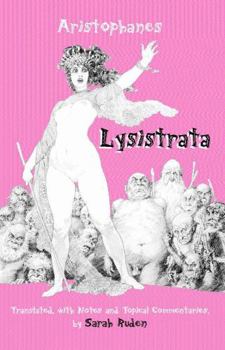Lysistrata
Select Format
Select Condition 
Book Overview
Aristophanes, a native Athenian and the leading exponent of Greek comedy, was born c. 450 BCE. Today forty-three of his plays are known by title; eleven survive. The most famous of these is the... This description may be from another edition of this product.
Format:Paperback
Language:English
ISBN:0872206033
ISBN13:9780872206038
Release Date:March 2003
Publisher:Hackett Publishing Company
Length:136 Pages
Weight:0.33 lbs.
Dimensions:0.3" x 5.5" x 8.5"
Customer Reviews
5 ratings
Pick your translation carefully
Published by Thriftbooks.com User , 18 years ago
Having read several different translations of Lysistrata, I can report that the one you select may make all the difference in your opinion of this early comedy. Roche's translation is very vulgar but has good footnotes: get ready for cockney Spartans, however. Jack Lindsay's translation, done in 1925 (included in the Bantam edition of Aristophanes) seems to be overly literary in comparison to the original but lacks notes. It reads well, though sounds a little old-fashioned. The bawdry is present but made less direct; in this one the Spartan dialect is Scottish. I found Parker's translation to be the least satisfactory. The "hillbilly" dialect he gives the Spartans is painfully overdone,not to mention inaccurate, and the speeches are awkward and pedestrian. An excellent edition overall is Alan H. Sommerstein's in the Penguin Classic "Aristophanes: Lysistrata and Other Plays." The introduction and notes are extremely informative, and the translation itself strikes the right note to represent Aristophanes' style in English. (Once again, though, the Spartans are Scots.) But perhaps the best choice is Sarah Ruden's 2003 edition. Her dialogue is unusually funny without straying too far from the original. Added value comes from her four very readable essays on Greek democracy, warfare, women, and comedy. It's also printed on quality paper and comes with a great cover!
Hilarious and Still Relevant
Published by Thriftbooks.com User , 19 years ago
Last semester, I took a college course on comedic drama. Lysistrata was one of the first plays the class read, and it, the oldest play we read, provided the room of twenty-somethings with our biggest belly-laugh of the semester. That, it seems, attests to the endurance of this theatrical masterpiece. The plot is outstanding. The country is involved in a needless war that is tearing everyone apart. In response, Lysistrata leads the women in a conspiracy to stop the war. They will lock themselves in the temple and withhold sex from their men until the war stops. The outcome is increasingly hilarious (and bawdy), and profound. And of course, the play wouldn't still be around if it were simply funny. There are layers of meaning here and, in true comedic fashion, an appeal to a better way of life. The play builds to an appeal to a more spirit-filled, more peaceful, and loving, way of living. It's no wonder that this play is still relevant 2500 years after it was written.
Strangely Appropriate...
Published by Thriftbooks.com User , 21 years ago
". . .Here's how it works:We'll paint, powder, and pluck ourselves to the lastdetail, and stay inside, wearing those filmytunics that set off everything we have- and thenslink up to the men. They'll snap to attention, go absolutely mad to love us- but we won't let them. We'll abstain.-I imagine they'll conclude a treaty rather quickly"I picked this up when I saw that many peace groups were putting it on as sort of an answer to the warlike nature of our times. Apparently, it's a timeless notion- The women of the city were tired with wars, so they decided to collectively cut their husbands off. Of course, this leads to man funny incedents, as neither men or women find it easy to deal with this.I wonder what everyone is suggesting today? The Great American Poke Out? This is a wonderful, short play, and the translation preserves all of the puns and metaphors that color this comedy with innuendo.In a warlike world, it's fun to be able to sit back and enjoy a llittle comic fantasy. And at the price, you're paying less than the average movie: for something far better, in my humble opinion.Get this book!
A complete book
Published by Thriftbooks.com User , 25 years ago
I think this is the best presentation of a Greek text, because there is a good introduction, a lot of help behind in the book, but no translation. So this is the ideal Lysistrata for students.
A play demonstrating the free will and power women posess.
Published by Thriftbooks.com User , 25 years ago
"The Lysistrata" by Aristophanes is probably one of the earliest pieces of litereature demonstrating the free will and power that women inherently posess, but have historically seldom used. In this comedy, the women of Athens, and then throughout Greece, bond together under the common goal of ending the war between the Athenians and Spartans, so that their husbands will return home. Knowing their physical limitations, the women decide on a plan of attack recomended by their leader Lysistrata. She convinces the women that, in order to get their husbands back, they must abstain from the joys of love. Lysistrata insists that everything the women do must be executed with the purpose of arousing their husbands, however, once they have their man's interest they are to act coy. "The Lysistrata" was written during a time when the Greek city-states where in a constant state of quarrelling. Aristophanes' use of comedy mocks the pointless wars of the time, while trying to focus attention back to the things that should matter most in a man's life. Like Shakespeare, Aristophanes is trying to deliver a political message to as many people as possible; so, to keep the interest of the common man, he has masked his political agenda with a delightful comedy.






